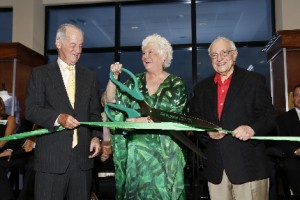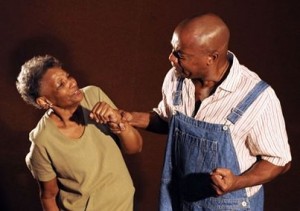By Bill Hirschman
Like the rest of the country, South Florida theater took tentative steps forward throughout 2013, banking on – in some cases making expensive bets on — the promise of a recovering economy and a durable demand for their art.
Hard evidence was visible everywhere across the three counties: theaters mostly opening not closing, established companies moving into new venues, young companies seemingly finding their audiences, runs being extended, a continued commitment to riskier experiments in content and form.
It was a heartening year: The opening of The Wick Theatre, the ability of the Maltz Jupiter Theatre to fund-raise and build a $2.5 million expansion in the space of a year; the financial stability of Slow Burn Theatre Company enabling it to add a third weekend to its schedules, and Arts Garage sealing the deal to buy its home. There was significant movement toward reopening both the Royal Poinciana Playhouse, and the Coconut Grove Playhouse, although the latter remains teetering on a knifepoint at this writing.
Mainstream legacy theaters like Broward Stage Door continued to enjoy some sold-out houses, perhaps because the region’s previous crop of retirees lost to mortality are being replaced by a new generation of retirees – although not in the same numbers.
But more challenging fare was becoming more common with companies like Outré Theater Company, Thinking Cap Theatre, Mad Cat Theatre, The Project [theater], New Theatre, even the Arsht’s Theater Up Close series pressing gently at boundaries and expectations. Some of these ventures succeeded artistically, some pointedly did not; some received box office support, others languished. But one result was, as hoped, Millenials and their parents were spotted at these programs – not in droves, certainly, but enough to be noticed.
Not all the news was good. Anecdotally, some theaters reported soft box office numbers in the fall and even into snowbird season. A few runs were cut short because you could count on your hands literally the number of people in the audience. Less noticeably but crucially, a handful of talented home-grown theater professionals left town, at least temporarily; but on the other hand, a few returned, at least temporarily.
Among the notable entries in the profit and loss ledger:
—-The most high profile event was the September opening of The Wick Theatre and Costume Museum in the former Caldwell Theatre in Boca Raton. Founder Marilyn Wick said she invested a million dollars in a massive renovation of the infrastructure, interior and exterior redecorations and the relocation of a slightly smaller version of her museum in Broward County.
Wick is counting heavily on the synergy of decidedly conventional shows like 42nd Street alongside receipts from the museum tour, gift shop, private rentals and dining in a room decorated like Tavern on the Green to make the project economically sound in the long run. She’s also investigating advertising methods not common among regional theaters here, such as renting a billboard near I-95 and placing pre-show ads in 20 movie theaters.
Internally, the Wick has had tumultuous personnel changes, some as recently as a few weeks ago. But at the same time, some performers have said the creative experience on The Sound of Music was as pleasant, warm and collegial as any they recall.
While Wick and company have been coping with a steep learning curve, they are committed to giving the undertaking two years. But it has had a rocky start: The inaugural show, The Sound of Music was well-received by the audiences who attended, but ticket sales were dispiritingly sketchy, leading to a six-figure loss. The second show, White Christmas did much better late in its run, but seats were never difficult to find.
On the other hand, Boca Raton’s noted benefactress, Henrietta, the Countess de Hoernle, whose $1 million jumpstarted the construction of the Caldwell building, donated $250,000 this month and encouraged her coterie to give generously as well.
—-Further north a month later, the carefully-managed success of the Maltz Jupiter Theatre was validated when it opened its 11th season by unveiling a transmogrified lobby, upstairs lounge, skybox-like seating and many other changes. Amazingly, the Maltz raised $2.5 million, designed the overhaul and cut the ribbon on completed work in one year. The kicker is that the staff and board plan to delay further fundraising for only a year – then dive back in to underwrite an even bigger expansion project.
—-The multi-disciplinary Arts Garage in Delray Beach, which houses Louis Tyrrell’s theater, played out a real-life cliffhanger when a law firm tried to buy the venue built into a parking garage in a burgeoning arts, dining and entertainment district. But this spring, the city commission finally agreed to sell premises to the two-year-old company for a bargain basement $2.5 million. The catch is that Arts Garage operates with little cash on hand and its executives did not even want to pay a $1,000 deposit, saying they want to spend all their available money on programming. Instead, they struck a deal this month with the commission to pay the debt out of cash flow receipts over 30 months. The purchase includes the adjoining space currently occupied by the Puppetry Arts Center whose lease runs out in a year from now. Once the debt is paid off, Arts Garage plans to expand into that space, reorienting its stage and creating room for its expanding educational programs, said Alyona Aleksandra Ushe, executive director.
—-Expansion was also announced for Thinking Cap Theatre, Nicole Stodard’s company that has presented experimental, provocative and socially-conscious work fare for three years at the 55-seat Empire Stage in Fort Lauderdale. It plans to double its programming and staffing while retrofitting a former 1940s church at 1501 N. Andrews. The new space across from Broward General Hospital in Fort Lauderdale with room for 99 patrons should open this spring under the name The Vanguard. Thinking Cap would be the resident company but would open the space to other groups.
—-The fiscally-cautious Slow Burn Theatre Company in Boca Raton announced two major initiatives: First, it added a third weekend of performances for its hit show next to normal at a new venue, Aventura Arts & Culture Center, and planned to do the same in 2014 for its third show of the season, Chess. But recently, Slow Burn’s leaders decided to add a third weekend for all its shows including Parade and High Fidelity at the cavernous auditorium at its home base at the West Boca Community High School.
—-At the box office, receipts looked like a fever chart in the stock market, often for the same theater company in the same year. Palm Beach Dramaworks extended runs for A Raisin in the Sun, The Lion in Winter and Of Mice and Men. The Plaza Theatre in Manalapan extended Waistwatchers the Musical, closed it only because of another commitment, then brought it back weeks later. Gay-themed theater at Island City Stage and the new Kutumba Theatre Project regularly sold out the tiny Empire Stage venue. Broward Stage Door had several sold-out houses in its Coral Springs location but struggled mightily when the works were moved to the Byron Carlyle Theater in Miami Beach. Like a few other theaters, it closed Moon Over Buffalo at the Carlyle after only a few performances. It prudently replaced some of its larger budget shows planned for 2014 with quality titles that have smaller casts. Other shows disappointed their producers, regardless of their high quality, such as Actors Playhouse’s terrific Ruthless.
—-In some cases, existing companies moved to new and/or larger venues, most of which confirmed their continuing growth and health. Mad Cat Theatre Company moved from Miami Light Project’s gleaming home in the somewhat seedy Wynwood arts district to a more compact but welcoming venue at Miami Theater Center’s Sandbox black box space in Miami Shores. Boca Raton Theatre Guild and The Women’s Theatre Project opened their new seasons in roomier and slicker surroundings at the Willow Theatre at Sand Creek Park in Boca. Kutumba traveled a few blocks from the pocket-sized Empire Stage to expansive digs at the Fort Lauderdale Children’s Theatre in the Galleria Mall in Fort Lauderdale.
—-Not every piece of facility news was welcome: A suspected sewer main break at The Roxy Theatre Group locked out New Theatre this fall, forcing them to bravely and imaginatively move their next two events to Artistic Vibes, a quirky free form space in a small warehouse near The Falls shopping center in Miami. The Roxy, a children’s theater complex, moved its classes to several other venues as it tried to regain access to its property.
—-Echoing Sondheim’s “I’m Still Here,” Ground Up and Rising, the tiny scrappy and peripatetic company reemerged in September after months under the radar with a promising production of Rajiv Joseph’s Gruesome Playground Injuries at the Artistic Vibes locale.
—-In the yin and yang department: The 33-year-old Tamarac Theatre of the Performing Arts shut down in June when its landlord evicted the company, one of the few casualties in 2013. But its pending production of The Boys Next Door was rescued by director Gilbert Lenchus and others involved in the show who moved it to the fledgling Down Front Theater Company in Plantation. On the other hand, Pembroke Pines Theater of the Performing Arts, the venerable PPTOPA, is continuing to thrive, so much so that it has gotten the rights to be the first community theater in the region to mount Les Miserables, later this summer.
—-Teddy Harrell’s African American Performing Arts Community Theater kept producing shows all year such as Emmett and Anne, Fences and The Amen Corner. But the stakwartM Ensemble, which bills itself as the oldest continually operating African American company in the state, produced only one show in March and a playwriting seminar in concert with Florida Memorial University. Early this month, they accepted a $30,000 grant from the Knight Arts Challenge to allow Memorial students to audition for roles and work on the crew. The money also will provide free admission to college students for four performances and a reduced price for other students in Miami-Dade County.
Then there were cross-your-fingers developments.
—-The Royal Poinciana Playhouse may yet rise again as a professional regional theater. The National Arts Institute, a non-profit group known for its youth programs, signed a long-term lease in October with the landlord of the landmark theater. The group plans to raise money from the public to extensively renovate the long-shuttered jewel box theater in Palm Beach along with its attached supper club to produce several kinds of work.
—-The state of Florida agreed in August to lease the Coconut Grove Playhouse to a consortium of Miami-Dade County, Florida International University and GableStage to build a new facility on the adjacent parking lot for a combined professional and educational undertaking. But as of this writing, deal-breaking debts must still be cleared by the county by Jan. 15 or the property could go back on the auction block where developers could bid on it.
—-About a half-dozen would-be professional and community theater groups sent news releases or unofficial word that they would be emerging in 2014 as new companies offering local audiences a wide range of niche work.
But that was just the monetary end of the equation. No theater scene can thrive without quality productions and 2013 provided dozens of impressive offerings, including a few comparable to the work of nearly any regional theater in the country. A subjective review of the most outstanding work can be found in our annual best-of list by clicking here.
As mentioned earlier, several theaters kept stretching their creative horizons and nudging audiences to a more wide-reaching vision of what theater can be. Mad Cat Theatre Company, the granddaddy of such troupes now in its 14th season, delivered the off-beat Cat Lady from Kristina Wong which got a mixed reaction from audiences. But Mad Cat scored with the fever dream Blow Me by Jessica Farr, featuring a tour-de-force performance by Erin Joy Schmidt as troubled fashion icon Isabella Blow.
New Theatre kept alternating traditional fare such as Agnes of God with less known work such as Bird in the Hand and boundary-pushing entries in its youth-oriented Boomfrog series such as its opinion-dividing My First, My Fist, My Bleeding Seeded Spirit.
The Arsht Center continued its commitment to progressive theater by teaming up with the University of Miami for a reimagining of Mary Zimmerman’s tribute to storytelling, Metamorphoses, a highly stylized retelling of Ovid’s mythological tales around and in a shallow pool of water. Thinking Cap Theatre delved into the classical-as-avant-garde with its production of The Rover, director Nicole Stodard’s resurrection of a 300-year-old comedy by England’s first professional female playwright.
Still, these were the exceptions to the rule. Far chancier work is being done more frequently in other cities around the country, and even locally in other disciplines such as dance and performance art. It’s ironic that aside from Mad Cat, much of the most accomplished and well-funded work in this niche is being imported to the Arsht Center from the House Theatre of Chicago.
One of the companies most devoted to work outside the mainstream is Outré Theatre Company which mounted the superb An Iliad, a one-man show starring Avi Hoffman as a storyteller condemned to wander time retelling the folly of the Trojan War and connecting it to the succeeding centuries of conflict. It also presented a full production of Jonathan Larson’s chamber musical tick…tick… BOOM and a concert try-out (albeit with a lot of staging) of the in-your-face satirical rock musical Bloody Bloody Andrew Jackson.
Even some veteran companies continued to pump up the level of work being offered. The quality at Broward Stage Door in Coral Springs has always ebbed and flowed, but certainly it has been flowing this past year with such artistic successes as The Twilight of the Golds, Sophisticated Ladies and The Last Night of Ballyhoo.
The other trend seems to be (we haven’t sat down and counted) that there were marginally fewer world premiere productions than in the previous season or two. But one of them, Zoetic Stage’s Fear Up Harsh by Christopher Demos-Brown, would have been a winner in any season. Some others needed more time in the oven, a continuing curse of new work in South Florida. In particular but with notable exceptions, short plays trotted out for a proliferation of festivals showed the need for a couple extra readings in someone’s living room before companies charged money to see them.
Looking to 2014, South Florida faces a welcome embarrassment of riches. But the headline maker is GableStage’s Antony and Cleopatra. Miami native and now internationally feted playwright/director Tarell Alvin McCraney has transported Shakespeare’s classic to colonial Haiti. This co-production with the Royal Shakespeare Company and the Public Theater in New York City is certain to bring international attention to this region’s arts scene next month when it travels here from its debut in Stratford-Upon-Avon and en route to a run in Manhattan. But the relatively modest production may set a record for the most expensive production ever mounted in the southern third of the state: $2.1 million, of which GableStage has to raise $700,000. By comparison, Maltz’s big budget musicals can cost between $400,000 and $500,000.
A completely subjective and woefully incomplete list of what else sounds intriguing is:
In January, Slow Burn’s Jason Robert Brown/Alfred Uhry musical about anti-Semitism, Parade; Tony Finstrom’s one-night reading of his play about Jan McArt, Glamour Girl, at Lynn University; the Maltz’s A Chorus Line, which if anyone can do it, they can; Assassins at Zoetic Stage because we’re Sondheim fanatics; The Journey, a premiere concert reading of a new musical by Outre’s musical director Kristen Long; Old Times at Dramaworks because virtually no one locally does Harold Pinter, and Mad Cat returns with a second edition of Mix Tape.
In February, look for the exhilarating Tony-winning musical Once from Broadway Across America at the Arsht; Other Desert Cities, Jon Robin Baitz’s acclaimed family drama at the Maltz; Plaza Theatre’s Rags, a heart-stirring musical by Charles Strouse (Bye Bye Birdie), Joseph Stein (Fiddleron the Roof) and Steven Schwartz (Wicked) that has never quite worked but whose creators have given the Plaza permission to rework; Red Hot Patriot: The Kick-Ass Wit of Molly Ivins at The Women’s Theatre Project.
In March, Zoetic does a new Michael McKeever play, Clark Gable Slept Here; Dramaworks takes on another playwright rarely produced in Florida with Horton Foote’s Dividing The Estate; Outré dares to offer the scathing and downright uncomfortable satire about a little girl with a disturbing imaginary friend, Noah Haidle’s Mr. Marmalade.
In May, we can hardly wait for GableStage’s mounting of Christopher Durang’s hilarious Vanya and Sonia and Masha and Spike, and New Theatre’s production of the ATCA/Steinberg prize-winning drama Gidion’s Knot.
And finally, in July, GableStage will produce Samuel Hunter’s The Whale, a deeply-affecting story of a morbidly obese man trying to come to terms with his family before he dies.
So much for theater being dead.












 A PaperStreet Web Design
A PaperStreet Web Design
